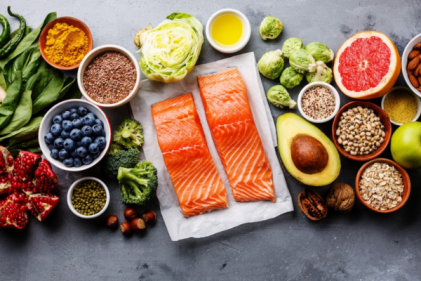
With most things in life, getting the balance right is key. And hormones are no exception. For women in their thirties and forties, this balance may well be tipping in the wrong direction when it comes to oestrogen.
What is oestrogen?
Oestrogen is the overall name for a group of specific hormones responsible for many of the female characteristics and reproductive functions in a woman's body. It has a strong impact during puberty and throughout a woman's fertile life. Oestrogen is responsible for developing a strong womb lining to help achieve pregnancy. It also helps develop the placenta during early pregnancy, and then naturally lowers during pregnancy to prevent further ovulation. It is also believed to have influence over bone health, cholesterol and circulation. When a woman reaches menopause, oestrogen levels decline and the menstrual cycle ends.
What is Oestrogen Dominance?
'Oestrogen Dominance' is the term used to indicate that the actions of oestrogen in the body are overpowering. This may be due to higher than normal levels of oestrogen, low levels of progesterone (the 'partner' hormone that takes over from oestrogen in the second half of the menstrual cycle), or a combination of both.
Oestrogen Dominance, especially in the later years of fertility, is very common. Dr Sara Gottfried, the author of 'The Hormone Cure', estimates that 70 to 80 percent of women in their thirties and forties will have some degree of dominant oestrogen.

Signs of Oestrogen Dominance
- Painful periods that may be heavy and/or prone to flooding
- Breast pain and fibrocystic breasts
- Low libido
- Severe pre-menstrual symptoms, including headaches and skin breakouts.
- Spotting before the period starts
- Low mood, depression or anxiety
- Endometriosis or fibroids
- Weight gain around the middle and thighs, especially pre-menstrually
Needless to say, when any hormone is out of balance, it disrupts the entire delicate system within the body. The effects of dominant oestrogen will not simply be limited to the menstrual cycle. Dr Christiane Northrup, author of 'Women's Bodies, Women's Wisdom', says overpowering oestrogen also influences allergies, autoimmune disease, blood clotting as well as female cancers.

What causes Oestrogen Dominance?
Environmental oestrogen
Humans are exposed to many sources of external oestrogen-like compounds through plastic food and drink packaging, cosmetics, cleaning products, food chemicals, pesticides and pollution in the air and water.
Age
Progesterone naturally declines as we near menopause, and the body begins to wind down ovulation, allowing oestrogen to rise unchecked through some menstrual cycles.
Stress
Stress impairs our body's ability to regulate hormones. In fact, the impact of stress hormones on the body's other hormones is quite profound and far-reaching, affecting the reproductive, thyroid and metabolic systems. The stress hormone cortisol also interferes with the body's progesterone receptors.
Low fibre, high refined-carbohydrate diet
Fibre is essential to help remove excessive oestrogen from our body. Refined carbohydrates not only lack good dietary fibre, they quickly raise blood sugars and insulin levels interfering with efficient metabolism.

How to regulate hormones
The aim is helping the body to restore its natural balance. Eating a healthy diet rich in high-fibre, nutrient-dense plants will support the body in keeping check on oestrogen. Women with significant oestrogen dominance will benefit from reducing the amount of red meat they consume, focusing on plants, fish and legumes. Make sure your liver is working efficiently by reducing the toxin load your body has to deal with – eat organic food, use natural cosmetics and cleaning products, avoid processed and sugary foods, and cut back on alcohol.
Keep a regular check on stress by including daily ‘anti-stress’ self-care rituals, such as meditation, relaxing walks, and rest and fun hobbies; and cut back on caffeine. Consider some helpful supplements, in particular zinc, magnesium and essential fatty acids. Using acupuncture is a very effective way to help restore equilibrium to your hormones, as well as reducing stress and increasing energy.
Fiona O’Farrell is a licensed acupuncturist and naturopath and runs The Gate Clinic in Greystones, Co. Wicklow. She specialises in women’s health, pregnancy, and fertility. For more information call 01 201 7210 or visit www.thegateclinic.ie.








